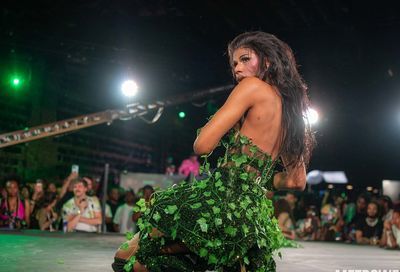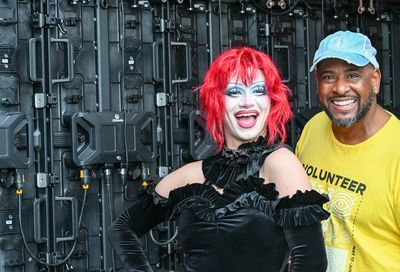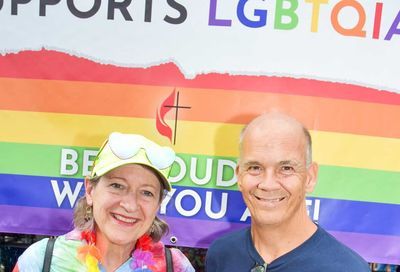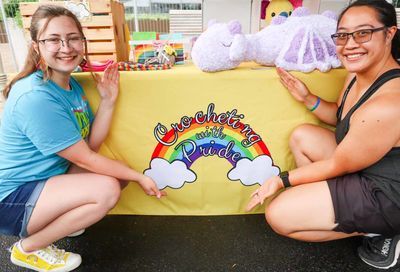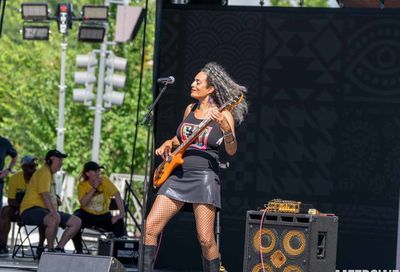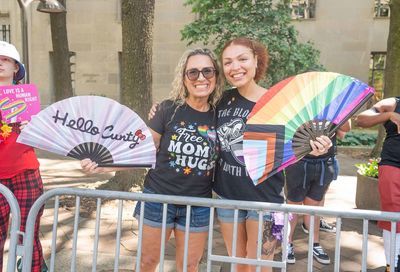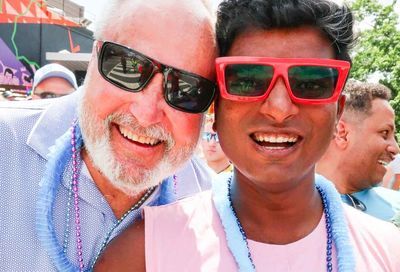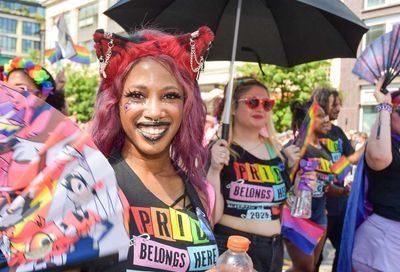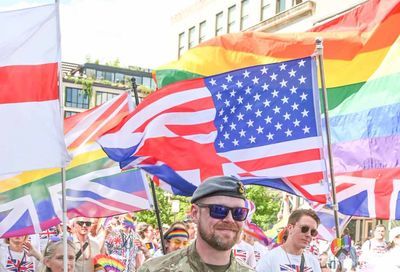Unfriendly Skies
Learning Curve
With all the drama over terrorism and airport security since September 2001, it’s easy to forget that plain old-fashioned homophobia can also ruin a good flight. There’s a huge difference between the friendly “Nice freedom rings!” from a gay flight attendant on that trip to San Francisco, and being strapped in next to a Mormon missionary while trying to relax with a copy of, say, Dan Savage’s Skipping Towards Gomorrah.
I have often left copies of Curve or Girlfriends in airplane seat pockets for the next lesbian traveler or flight attendant to enjoy. And these days I’m as stoic as the next homo with airport security searches that involve investigating certain battery-powered accessories in my flight bag (“Ma’am, would you turn that on for me?”) or body patting (“Ma’am, I need to check your breasts with the back of my hands now”).
On one memorable occasion, though, I actually witnessed an incident of real homophobia and, by filing a complaint, I made a difference.
It was ten years ago, and I was flying home from the National Women’s Music Festival in Indiana. We’d been besieged by tornado warnings all week, and my flight was packed with women from the festival, all talking about the wild weather we’d survived.
|
Unexpectedly, our short flight to Chicago was diverted to land in Peoria because of another cyclone warning. We sat on that runway for several hours — every traveler’s nightmare, for though we were glad to be safe, there was no food or drink made available, and we were instructed not to get out of our seats even to stretch.
I was in a far back row. In the front section of the plane, a woman I recognized from the festival politely asked for a snack or soda, explaining that she was diabetic. She asked if she could solicit snacks from other passengers who might have fruit or candy in their carry-on bags. The flight attendant ordered her to sit back down and stop causing trouble — there was no snack service for anyone — we’d be on our way soon.
I knew the flight staff were having a bad, bad day, and their harried manners were matched in no small part by some pretty demanding passengers, but this exchange seemed really uncalled for.
In a medical situation, with all of us stuck there together with nothing to do, why forbid a simple call for volunteers to pass up a friendly apple or granola bar? But here’s what followed. The annoyed flight attendant charged back to the rear of the plane, where I was seated, and complained to a co-worker “Did you hear what that big he/she/it asked me? Everyone claims they’re a diabetic when they’re hungry. I said to it, don’t you cause trouble for me.” And it went on from there.
Well, as all my pals know, by ship, train or plane, I travel with my journal flopped open in my lap. At 30,000 feet, with cabin air pressure, this has caused many a splotch of fountain pen ink on my khakis; but now I was delighted to be so well-positioned to write down, verbatim, the entire dyke-mocking diatribe I heard going on behind me. In no time I had the situation written out as a nice chunk of investigative journalism and, when we finally landed at O’Hare, I walked right into the managerial offices of that airline and presented my report.
The results were fabulous. Within a week I received two concerned and apologetic phone calls, one from the airline’s vice president and one from the supervisor of flight attendants’ training. Both authorities expressed shock and dismay that any passenger in need of medical assistance would be spurned. But I was heartened that they also affirmed a nondiscrimination policy and expressed appreciation for their gay and lesbian clientele.
They promised to retrain the flight attendant, at which point I stressed that my intention wasn’t to get her ass fired — I knew all about the historic struggle of “stewardesses” to overcome sexist guidelines and to get decent pay. Hadn’t Patricia Ireland, heroic President of the National Organization for Women for so many years, started out as a flight attendant? No, I just wanted to point out that “he/she/it” comments hurt. We do overhear them. Whispered asides won’t do, either — plenty of my pals, particularly those working at festivals, are deaf or sign language interpreters who can read lips. We’d like to have our hard-earned dyke dollars translate into courtesy in the skies, even if we don’t look like Vogue models, even if we present occasional diabetic symptoms. (By the way, the woman passenger I’d defended also received a handsome apology from the airline.)
I think about this incident whenever I read about medical teams or emergency caregivers who make fun of transgendered crime victims or gay and lesbian patients in distress. More to the point, no less a member of our community than Daphne Scholinski (author of The Last Time I Wore A Dress) has lately begun speaking out on the slap to our humanity at airports when security guards bellow out “Call over a female guard! I guess it’s a woman — I thought she was a guy! ”
Sensitivity to gender and the need to present good manners to queer travelers may seem low on the list of current federal priorities. But last time I checked, being a lesbian didn’t exempt me from paying taxes to a government that recently federalized airport screening practices. Because I don’t necessarily “look gay” myself (and what does that mean? — a subject for a future column), I’m oddly equipped to be a better witness when my more radical-looking peers get second-class treatment. Fortunately, I’ve got the moxie to speak up — and I hope that if I’m ever subject to insult in a public place, that others will act to defend me.
Bonnie J. Morris, Ph.D., is on the women’s studies faculty at George Washington University and Georgetown University. She can be reached at bmorris@metroweekly.net.
Support Metro Weekly’s Journalism
These are challenging times for news organizations. And yet it’s crucial we stay active and provide vital resources and information to both our local readers and the world. So won’t you please take a moment and consider supporting Metro Weekly with a membership? For as little as $5 a month, you can help ensure Metro Weekly magazine and MetroWeekly.com remain free, viable resources as we provide the best, most diverse, culturally-resonant LGBTQ coverage in both the D.C. region and around the world. Memberships come with exclusive perks and discounts, your own personal digital delivery of each week’s magazine (and an archive), access to our Member's Lounge when it launches this fall, and exclusive members-only items like Metro Weekly Membership Mugs and Tote Bags! Check out all our membership levels here and please join us today!



















